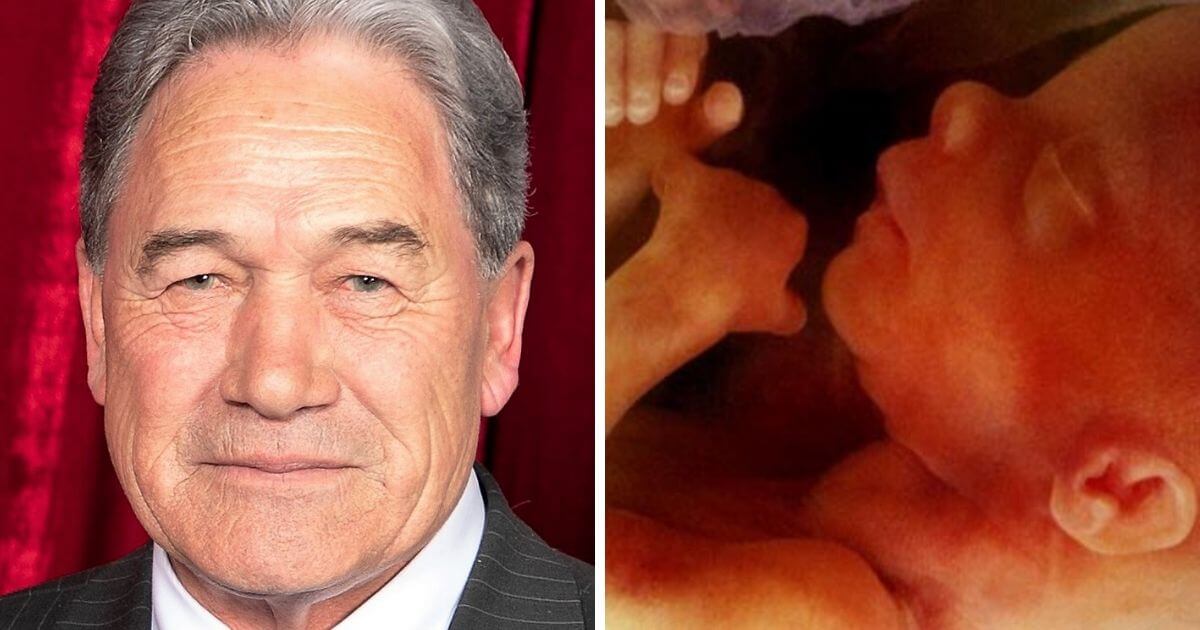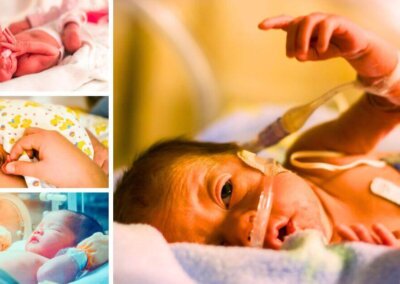Voters in New Zealand are calling on their Deputy Prime Minister and leader of the New Zealand First Party, Winston Peters, who was elected on a ‘values’ and pro-life vote in the last general election, to withdraw his bill which will introduce the world’s most extreme abortion law to New Zealand.
Ahead of the 2017 New Zealand election, Winston Peters cornered the ‘values’ and pro-life vote making it clear to voters that his New Zealand First Party would not ‘decriminalise’ abortion (introduce an extreme abortion law allowing abortion up to birth) and that they would support a change to the law to state that the unborn child has a right to life; to improve informed consent during the abortion process, and to implement parental notification for girls aged 15 and under seeking abortions. This reinforced a clear long-standing position which had been communicated to voters over a number of years.
Once in Government, Winston Peters has joined his coalition partner in bringing forward a bill to introduce the most extreme abortion legislation in the world – which would allow abortion de facto on demand, for any reason, up to birth – to the New Zealand Parliament.
This bill is very much his bill. He had his MP, Tracey Martin, work on co-writing the bill, along with the Justice Minister, over an eight-month period. Then his cabinet, in which he is the number two ranked minister, signed off on the bill.
MOST EXTREME ABORTION LAW IN THE WORLD
Canada is the only country in the world that has no abortion law, as their law was struck down by a case brought to their Supreme Court in 1988.
Amongst the rest of the jurisdictions in the world that have abortion legislation, Victoria, Australia, currently has the most extreme law.
The law in Victoria allows for abortion right through to birth on physical, psychological and social grounds when approved by two doctors; this can be the abortion operating surgeon and anaesthetist.
This has, in practice, allowed for abortion on demand, for any reason, right through to birth in Victoria, Australia.
Ahead of the legislation being introduced in Victoria in 2008, abortion activists claimed that, although abortion would, in practice, be allowed for any reason, doctors would ensure that the vast majority of abortions would only occur in rare circumstances, such as when a baby had a condition where they would either die in the womb or shortly after birth (a fatal foetal abnormality or life-limiting disabiity) – similar claims are currently now being made about the proposed NZ abortion law by abortion campaigners and MPs in New Zealand.
Data from the 12 years of the law being in operation in Victoria shows that this has not been the case. Right To Life UK’s Public Affairs team have undertaken an extensive analysis of published abortion data on late-term abortions in Victoria from The Consultative Council on Obstetric and Paediatric Mortality.
This data shows that since the law changed in 2008, 1,418 late-term abortions (between 20-weeks’ gestation and birth) have been performed, allowed by doctors for ‘psychosocial’ reasons – these were terminations where the baby did not have a disability and the abortion was performed on social grounds. In 2011, one of these abortions on social grounds occured at 37 weeks.
Under New Zealand law currently, abortion is allowed post-20 weeks on very strict grounds (when the abortion is “necessary to save the life of the woman or girl or to prevent serious permanent injury to her physical or mental health”).
This strict law has meant that abortions post 20-weeks are rare – for example 72 abortions occurred after 20-weeks in New Zealand in 2017.
Victoria has a population that is only 32% larger than New Zealand’s, but the number of abortions that occurred post 20-weeks were much higher, 323 or 348.61% higher than the number that occurred in New Zealand that same year (published data for Victoria has not been released for 2018 yet).
Another side effect of the very high late-term abortion rate in Australia is that scores of babies have been left to die after being born alive during a number of ‘botched’ terminations.
The Victorian Consultative Council on Obstetric and Paediatric Mortality and Morbidity reported that in 2012 there were 53 ‘terminations of pregnancy’ after 20 weeks ‘resulting in live birth’.
By contrast, a 2008 report for England and Wales found that 66 infants were born alive after NHS terminations in one year. While these figures are comparable in number, Victoria’s population of 6.36 million is just a tenth of the size of the population in England and Wales.
A Channel 7 news report, broadcast on April 17 2010, reported that there had been a large increase in late-term abortions being performed at the Royal Women’s Hospital since the introduction of the 2008 Abortion Law Reform. Presenter Jennifer Keyte stated how “midwives and doctors feel traumatized” by having to perform so many late-term abortions at the Royal Women’s Hospital. Journalist Louise Milligan said that there had been some ‘alarming requests’ for late-term abortions, including a request for a termination at 32 weeks because the baby had a hare lip.
The Abortion Legislation Bill that Winston Peters’ Government has introduced, is even more extreme than the law in Victoria, Australia – making it the most extreme abortion law in the world.
It would allow abortions between 20-weeks’ gestation and birth with the go-ahead from just two health practitioners (this could include nurses and midwives) rather than the higher threshold of two doctors that are required in Victoria.
In the proposed legislation in New Zealand, the Abortion Legislation Committee have now widened the, already loose, criteria to include “overall well-being” – making it even easier for abortions to happen between 20-weeks and birth in New Zealand. These are undefined terms and it will be up to the health practitioner involved as to how they interpret them.
In addition to introducing abortion de facto on demand, for any reason up to birth, the bill will also make the following extreme changes to New Zealand abortion law:
- The current 20-week limit for disability-selective abortion will be scrapped, introducing abortion up-to-birth for any disability including Down syndrome, cleft lip and club foot.
- Sex-selective abortion will be legalised.
- There will be no legal restrictions on locations where abortions can take place – abortions could be performed almost anywhere including schools, mobile abortion clinics and through ‘Facetime’ consultations.
- There will be no requirement that a doctor must be involved in an abortion.
HOW WINSTON PETERS AND NZ FIRST CORNERED THE ‘VALUES’ AND PRO-LIFE VOTE
Winston Peters has carefully targeted the ‘values’ and pro-life vote over a long period of time leading up to the 2017 election. This included speaking at Family First’s high-profile Forum on the Family event along with consistently brandishing his pro-life credentials with ‘100% pro-life on abortion’ ratings in a number of leader questionnaires on life issues.
The results of these questionnaires have been circulated in Value Your Vote guides to tens of thousands of households across New Zealand and positioned his party as the one to elect for this part of the voting public.
In the 2017 Value Your Vote guide issued ahead of the 2017 election, Peters stated that he took the following position on abortion:
- Opposed the ‘decriminalisation’ of abortion (introduce an extreme abortion law allowing abortion up to birth).
- Supported a change in law to state that the unborn child has a right to life.
- Supported introducing abortion informed consent legislation, to improve the informed consent during the abortion process.
- Supported introducing abortion parental notification legislation, to implement parental notification for girls aged 15 and under seeking abortions.
He provided similar responses in earlier questionnaires which were published in previous guides going back a number of years, including a 100%/ ‘four smiles’ rating on abortion/pro-life issues in 2014.
This position was mirrored in a 2014 interview on stage at the high profile Forum on the Family election event where Winston Peters said:
- Life starts at conception.
- That he did not support decriminalising abortion (introducing an extreme abortion law to New Zealand).
- “Do you support the Green’s policy of ‘decriminalising’ abortion? No we don’t.”
- That he supported parental notification for a girl 15 years or younger to obtain an abortion.
This was reinforced by Tracey Martin, who represented Winston Peters and NZ First on stage at the 2017 Forum on the Family election event where Martin confirmed that the party supported keeping abortion in the Crimes Act (not ‘decriminalising’ abortion) and that the party supported introducing abortion parental notification legislation.
The pro-life and ‘values’ vote in New Zealand can have a significant impact for smaller parties that successfully corner it. In recent years, New Zealand First has positioned itself as the only electable party which has taken a clear moderate pro-life position, seeking to oppose ‘decriminalisation’ and introduce new incremental abortion restrictions. This was especially important to many voters ahead of the 2017 election as the Labour Party was pledging to ‘decriminalise’ abortion, and NZ First had made it clear to voters that they would not support ‘decriminalisation’ and wanted to see abortion laws further restricted.
There could be a big move of these voters post-election away from New Zealand First if Winston does not withdraw his bill.
REFERENDUM AMENDMENT CLAIMS
Winston Peters has hidden behind claims that he will introduce a referendum amendment at Committee stage of the bill to give New Zealanders a say on whether this extreme bill becomes law.
This appears to have been a move to try and stop voters from leaving the party; the problem with this approach is that it will not be part of the core bill, and he does not have the support of sufficient numbers for it to pass.
If he was serious about letting the New Zealand public have a say on whether this bill becomes law, he would have insisted that his Government include a provision guaranteeing a referendum on this issue in the body of the original bill, but this was not included.
Polling from Curia research shows only 4% of the New Zealand population support introducing abortion up to birth. This is a bill designed to appeal to a tiny minority of abortion zealots, not the vast majority of sensible New Zealanders who find the idea of late-term abortions inhumane and barbaric.
Winston Peters’ Government is in control of the passage of this bill and has the power to withdraw the bill.
Right To Life UK is encouraging the public to sign a petition calling on Winston Peters to immediately withdraw his Government’s Abortion Legislation Bill. Click here to sign the petition now.
A number of NZ First voters who Right To Life UK have spoken to said they were outraged about Winston bringing forward the bill and stated that they would never be voting for his party again if he did not urgently get his Government to withdraw the Abortion Legislation Bill.





